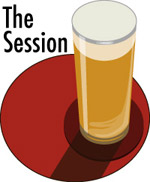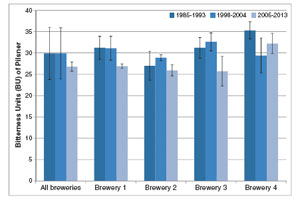MONDAY BEER LINKS, MUSING 06.08.15
I’m not sure how many bloggers ended up participating in The Session #100 on Friday, but every entry I’ve read has been above average interesting. And there were a couple other posts — the first three listed here — that seem related.
A full disclosure: the making of 1883 Lager.
Tiah Edmunson-Morton tackles the challenge of finding pre-Prohibition beer recipes (and brewing logs) to come up with a recipe for Hopworks Urban Brewery (and here’s their version of the story).
[Via Oregon Hops & Brewing Archives]
The three-threads mystery and the birth of porter: the answer is …
Martyn Cornell tackles “One of the biggest mysteries in the history of beer.” In the end he writes that not everybody will agree with conclusions. Same facts, different views. Something to remember when discussing beer history. An aside, it is the people who don’t pay attention to the facts that drive me bonkers. [Via Zythophile]
Lazarus beers: 6 brands that should be raised from the dead.
Don Russell talks about specific beers, not styles, and from more recent history. {Via Joe Sixpack]
Cans or bottles? Surprising results from two blind taste tests.
As the headline suggests, surprising results. They are a reminded blind taste tests are a valuable tool, but as humans we may not always taste things the same way. It makes me think that as well as tasting the same beer from a bottle as a can it would be interesting to do a similar test comparing two bottles from the same six pack. [Via Microbrewr]
Drink Parochial.
Miles Liebtag revisits the local/quality/diversity debate. It is even handed, but I don’t agree with his conclusion (there’s that “same facts, different views” thing): “Loyalty to your home is a beautiful thing, and in beer, art, music, literature and culture generally, like-minded people form enclaves that are specific to a place and foment wonderful bursts of creativity and innovation. But let’s not fool ourselves into thinking we’re talking just about culture. We’re talking about business.” Yes, you can’t overlook that brewing beer is a business. But we are talking about local culture. Local may change our appreciation of a beer. Most visits to the local pub are not for a blind beer tasting (or test, if you will). [Via BeerGraphs]
Does Oskar Blues Still Own Oskar Blues? Brewery Would Rather Focus on the Beer.
File this one under “bears watching.” [Via Westword]
How Big Lager Lost The Plot And Developed Narcissistic Personality Disorder.
And file this under sentences that make you think: “Premiumness in beer is not about this kind of cock-waving, and it never was. It’s about the premiumness of the experience the beer creates – the experience for which the beer is the catalyst, not the central focus.” There are times you don’t want a premium experience, or maybe I should say you want an experience you’ll enjoy and aren’t prepared to pay for premium. [Via Pete Brown]
 Reuben Gray has posted the roundup for The Session #100:
Reuben Gray has posted the roundup for The Session #100:  Here is a chilling thought: “If this trend of reducing the hop-content in (German) Pilsner beer continues, by 2030 the Pilsner beer will have similar composition to today’s export or lager beers.”
Here is a chilling thought: “If this trend of reducing the hop-content in (German) Pilsner beer continues, by 2030 the Pilsner beer will have similar composition to today’s export or lager beers.”